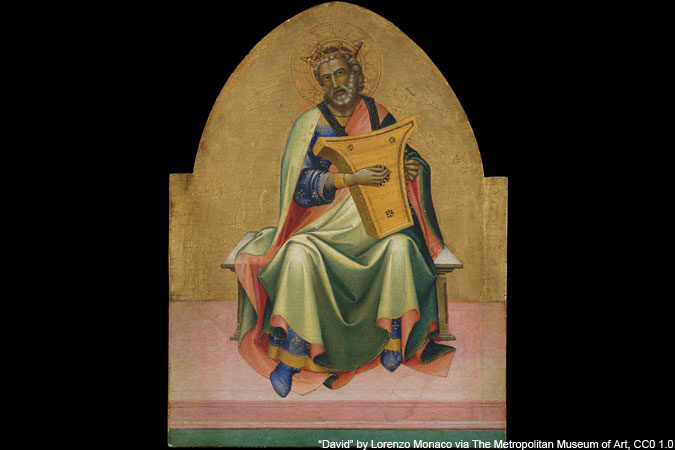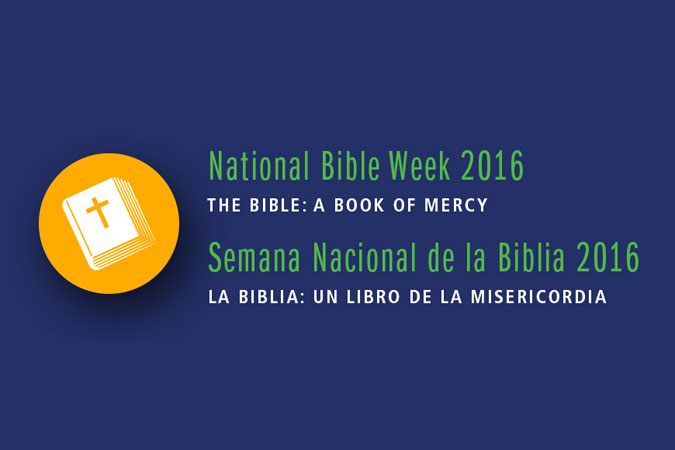
This is the fourth article in a series about figures in Salvation history and their relevance for catechists.
David, King of Israel, is possibly one of the most interesting characters in all of Scripture. He was a shepherd, the Lord’s anointed, giant-killer, loyal friend, singer of psalms, ambitious king, repentant sinner, and founder of the House of David, from which Jesus was descended. Because David is such an important person from the Old Testament, it’s good for catechists to know and teach his story, which is found in the books of Samuel.
God instructed Samuel to anoint David, a shepherd boy and the youngest son of Jesse of Bethlehem. David was an unexpected choice, but the Lord told Samuel, “The LORD does not see as mortals see; they look on the outward appearance, but the LORD looks on the heart.” (1 Samuel 16:7) Well-known as a skilled musician, David was sent to heal King Saul from headaches with music from his harp and his singing. Soon, David became part of King Saul’s household and the best friend of Jonathan, Saul’s son.
Shortly thereafter, David bravely confronted Goliath, a giant Philistine soldier, whom he killed using only his shepherd’s sling, a stone, and his faith in God. That made him tremendously popular, and Saul became jealous. He sent David away, but many soldiers followed him. A civil war erupted between the House of Saul and the House of David. David would ultimately emerge victorious as King of Israel.
David was a good king who wanted to honor God. He brought the Ark of the Covenant into Jerusalem. (2 Samuel 6:1–19) He wanted to build God a temple, but God sent the prophet Nathan to tell David he would not be the one to build it.
David, however, was not perfect. He had an affair with Bathsheba, the wife of Uriah, one of his officers. When she became pregnant, David arranged for Uzziah to be killed in battle. (2 Samuel 11:1–17) For this sin, David was punished. His favorite son, Absalom, rose up against David, only to be killed while fighting against his father. Eventually, David repented and received God’s forgiveness. He ruled well for the rest of his years as king. Another son, Solomon, ruled long and wisely after him, building the temple for God that his father had wanted to build.
What are some teaching points about David for catechists?
- David was a shepherd. The image of a shepherd was used in the Old Testament to describe the perfect leader. Thus, Jesus is portrayed as the Good Shepherd who protects, guides, and cares for God’s flock.
- David was God’s anointed king. In the Sacraments of Baptism and Confirmation, we are anointed with sacred Chrism. This anointing marks us as chosen by God to participate in Christ’s mission.
- David showed courage in confronting Goliath. Courage is one of the Gifts of the Holy Spirit. We receive these gifts at our Baptism, and we are sealed with these gifts in Confirmation.
- David wrote most of the Psalms. The Responsorial Psalm is part of the Liturgy of the Word, and we pray the psalms during the Liturgy of the Hours. The psalms continue to be a major part of Christian liturgy today.
- Though David was a sinner, God forgave him. David’s story reminds us to examine our consciences and ask ourselves where we need to experience God’s forgiveness through the Sacrament of Reconciliation.
- David’s sorrow became a great joy. After Absalom was defeated and killed in battle, David mourned for the death of his son. Yet this tragedy reconciled the warring tribes of Israel. God can (and does) draw something good out of the tragedies we suffer, a fact that helps us live the Paschal Mystery in our everyday lives.
What ideas do you have to teach children about King David? How can King David’s stories help you lead children toward Christ?
Read the other articles in the Biblical Literacy for Catechists series.
Written by popular Catholic children’s author Amy Welborn, Loyola Kids Book of Bible Stories is a beautifully illustrated collection of warm and engaging Bible stories for children and their families. The book is arranged in a uniquely Catholic way—based on the liturgical year and the order in which the stories are proclaimed during Mass.




Be the first to comment